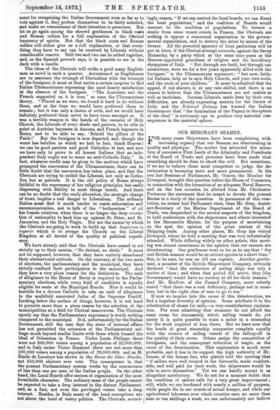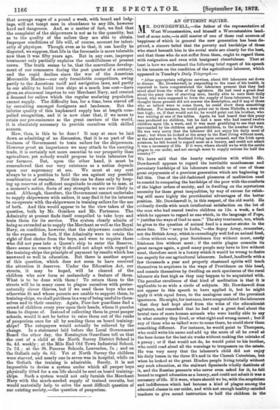OUR MERCHANT SEAMEN.
FOR many years Shipowners have been complaining with increasing urgency that our Seaman are deteriorating in quality and physique. The matter has attracted the atten- tion of successive First Lords of the Admiralty and Presidents of the Board of Trade, and promises have been made that something should be done to check the evil. But meantime, if we are to believe those most competent to judge, the de- terioration is becoming more and more pronounced. In the two last Sessions of Parliament, Mr. Graves, the Member for Liverpool, brought this question before the House of Commons, in connection with the formation of an adequate Naval Reserve, and on the last occasion he elicited from Mr. Chichester Fortescue the statement that he meant to devote the present Recess to a study of the question. In pursuance of this reso- lution, no sooner had Parliament risen, than Mr. Gray, Assist- ant-Secretary of the Marine Department of the Board of Trade, was despatched to the several seaports of the kingdom, to hold conferences with the shipowners and others interested in the Mercantile Marine, for the purpose of ascertaining on the spot the opinion of the great centres of the Shipping trade. Among other places, Mr. Gray has visited Liverpool, where he held a meeting that was very influentially attended. While differing widely on other points, this meet- ing was almost unanimous in the opinion that our seamen are deteriorating. One gentleman went so far as to say that "the real British seaman would be an extinct species in a short time." But, to be sure, he was an old sea captain. Another gentle- man, a member of the British Shipowners' Company, seriously declared "that the extinction of sailing ships was only a matter of time ; and when that period did arrive, they (the Government) would have no nursery at all for their seamen." And Mr. MazIver, of the Cunard Company, more soberly stated "that there was a real deficiency, perhaps not in num- bers, but in the right class of men to go to sea."
If now we inquire into the cause of this deterioration, we find a hopeless diversity of opinion. Some attribute it to the substitution of steam for sails,—a very unsatisfactory explana- tion. For even admitting that steamers do not afford the same room for seamanship which sailing vessels do, yet surely it is quite possible to train a sailor in a steamship for the work required of him there. But we have seen that the heads of great steamship companies complain equally with the owners of sailing vessels of the falling-off in the quality of their crews. Others assign the competition of foreigners, and the consequent reduction of wages, as the cause of the deterioration. This explanation is much more probable, and it has in its support the high authority of Mr. Inman, of the Inman line, who plainly told the meeting that "if sailors were well treated in the forecastle, made comfort- able, and well paid for their work, the shipowners would be able to serve themselves." Yet we can hardly accept it as altogether satisfactory. We do not for a moment doubt that the condition of sailors calls for a very great improvement ; still, while we are burdened with nearly a million of paupers, while people die in our streets of actual hunger, and while our agricultural labourers over whole counties earn no more than nine or ten shillings a week, we can unfortunately not believe that average wages of a pound a week, with board and lodg- ings, will not tempt men in abundance to any life, however bard and dangerous. And, as a matter of fact, we find that the complaint of the shipowners is not as to the quantity, but as to the quality of the sailors they are able to obtain.
Improper conditions of life will, of course, account for inferi- ority of physique. Though even as to that, it can hardly be disputed, we suppose, that life in the forecastle is more tolerable now than it was fifty years ago. But in any case, improper treatment only partially explains the unskilfulness of present crews. The truth seems to be, that the marvellous develop- ment of our commerce during the past quarter of a century, and the rapid decline since the war of the American Mercantile Marine—our only formidable competitors, owing partly to the American tariff and navigation laws, and partly to our ability to build iron ships at a much less cost—have given an abnormal impetus to our Merchant Navy, and created a demand for sailors which the regular seafaring population cannot supply. The difficulty has, for a time, been staved off by recruiting amongst foreigners and landsmen. But the inferior quality of this haphazard supply has at length com- pelled recognition, and it is now clear that, if we mean to retain our pre-eminence as the great carriers of the world, it is absolutely necessary to provide ourselves with skilled seamen.
How, then, is this to be done ? It may at once be laid down as admitting of no discussion, that it is no part of the business of Government to train sailors for the shipowners.
However great an importance we may attach to the carrying trade, it is certainly not more essential to our prosperity than agriculture, yet nobody would propose to train labourers for our farmers. But upon the other hand it must be remembered that our very existence as a nation depends upon our supremacy at sea. We must at any cost always be in a position to hold the sea against any possible combination of enemies. Now this can be done only by keep- ing up reserves of sufficient magnitude to enable us to man, at a moment's notice, fleets of any strength we are ever likely to need. Although, therefore, the Government cannot undertake to supply shipowners with sailors, it may find it for its interest
to co-operate with the shipowners in training sailors for the use of both. And this would appear to be the view taken of the
question, both by Mr. Goschen and Mr. Fortescue. The Admiralty at present finds itself compelled to take boys and train them for its service. The system clearly admits of being so extended as to supply the Merchant as well as the Royal Navy, on condition, however, that the shipowners contribute to the expense. In fact, if the Admiralty were to retain the right of first choice from the boys, and were to require those who did not pass into a Queen's ship to enter the Reserve, there seems no reason why it should not adopt with regard to the training-ships the principle of payment by results which has answered so well in education. But there is another aspect of this question, which does not seem to have received the attention it deserves. Under the Education Act, our streets, it may be hoped, will be cleared of the children who now form so melancholy a feature of them. What is to be done with them ? To return them to the streets will be in many cases to plague ourselves with preter- naturally clever thieves, but if we send those boys who are otherwise fit and whose parents are unable to support them, to training-ships, we shall put them in a way of being useful to them- selves and to their country. Again, Poor-law guardians find a crowd of children every year upon their hands, whom it puzzles them to dispose of. Instead of collecting them in great pauper schools, would it not be better to raise them out of the ranks of pauperism once for all by sending them on board training- ships? The ratepayers would actually be relieved by the change. In a statement laid before the Local Government Board the other day, the Kensington Guardians tell us that the cost of a child at the North Surrey District School is 8s. 4d. weekly ; at the Mile End Old Town Industrial School, 7s. 7d. ; at the St. Pancras Schools, Leavesden, 7s. ; and on the Goliath only 6s. 6d. Yet at North Surrey the children were starved, and nearly one in seven was in hospital, while on the Goliath the training is admirable. Surely, it is not impossible to devise a system under which all pauper boys physically fitted for a sea life should be sent on board training- ships. Such a system would not only furnish the Merchant Navy with the much-needed supply of trained recruits, but would materially help to solve the most difficult question of our existing society,—the question of pauperism.



































 Previous page
Previous page